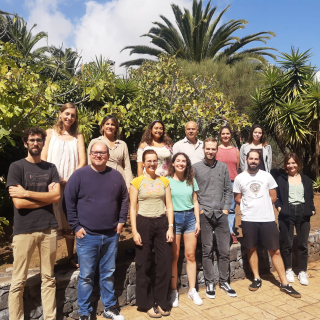Bibcode
Şen, Ş.; Peletier, R. F.; Boselli, A.; den Brok, M.; Falcón-Barroso, J.; Hensler, G.; Janz, J.; Laurikainen, E.; Lisker, T.; Mentz, J. J.; Paudel, S.; Salo, H.; Sybilska, A.; Toloba, E.; van de Ven, G.; Vazdekis, A.; Yesilyaprak, C.
Referencia bibliográfica
Monthly Notices of the Royal Astronomical Society, Volume 475, Issue 3, p.3453-3466
Fecha de publicación:
4
2018
Número de citas
13
Número de citas referidas
13
Descripción
We determine abundance ratios of 37 dwarf ellipticals (dEs) in the
nearby Virgo cluster. This sample is representative of the early-type
population of galaxies in the absolute magnitude range -19.0 <
Mr < -16.0. We analyse their absorption line-strength
indices by means of index-index diagrams and scaling relations and use
the stellar population models to interpret them. We present ages,
metallicities, and abundance ratios obtained from these dEs within an
aperture size of Re/8. We calculate [Na/Fe] from NaD, [Ca/Fe]
from Ca4227, and [Mg/Fe] from Mgb. We find that [Na/Fe] is underabundant
with respect to solar, whereas [Mg/Fe] is around solar. This is exactly
opposite to what is found for giant ellipticals, but follows the trend
with metallicity found previously for the Fornax dwarf NGC 1396. We
discuss possible formation scenarios that can result in such elemental
abundance patterns, and we speculate that dEs have disc-like star
formation history (SFH) favouring them to originate from late-type
dwarfs or small spirals. Na-yields appear to be very metal-dependent, in
agreement with studies of giant ellipticals, probably due to the large
dependence on the neutron-excess in stars. We conclude that dEs have
undergone a considerable amount of chemical evolution, they are
therefore not uniformly old, but have extended SFH, similar to many of
the Local Group galaxies.
Proyectos relacionados

Huellas de la Formación de las Galaxias: Poblaciones estelares, Dinámica y Morfología
Bienvenida a la página web del g rupo de investigación Traces of Galaxy Formation. Somos un grupo de investigación amplio, diverso y muy activo cuyo objetivo principal es entender la formación de galaxias en el Universo de una manera lo más completa posible. Con el estudio detellado de las poblaciones estelares como bandera, estamos constantemente
Ignacio
Martín Navarro

Huellas de la Formación de las Galaxias: Poblaciones estelares, Dinámica y Morfología
Bienvenida a la página web del g rupo de investigación Traces of Galaxy Formation. Somos un grupo de investigación amplio, diverso y muy activo cuyo objetivo principal es entender la formación de galaxias en el Universo de una manera lo más completa posible. Con el estudio detellado de las poblaciones estelares como bandera, estamos constantemente
Ignacio
Martín Navarro